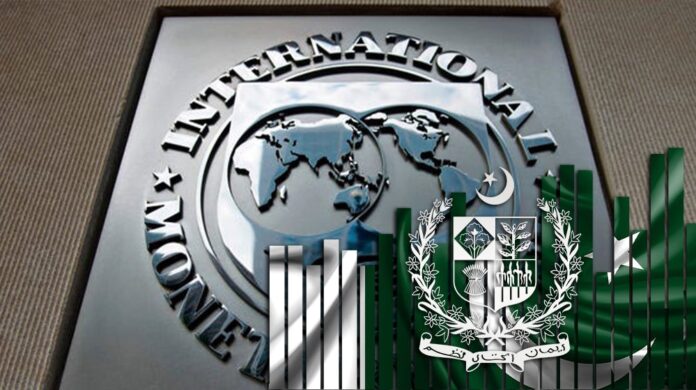The International Monetary Fund (IMF) has reached a staff-level agreement with the Pakistani authorities on the second review of the 37-month Extended Arrangement under the Extended Fund Facility (EFF) and the first review of the 28-month arrangement under the Resilience and Sustainability Facility (RSF), the global lender said in a statement.
The staff-level agreement is subject to approval by the IMF Executive Board. Upon approval, Pakistan will have access to about $1.0 billion (SDR 760 million) under the EFF and about $200 million (SDR 154 million) under the RSF, bringing total disbursements under the two arrangements to about $3.3 billion.
An IMF team, led by Iva Petrova, held discussions during September 24-October 8, 2025, mission to Karachi and Islamabad, and in Washington DC, for the second review under the Extended Fund Facility (EFF) and the first review under the Resilience and Sustainability Facility (RSF). At the conclusion of the discussions, Ms. Petrova issued the following statement:
“Supported by the EFF, Pakistan’s economic program is entrenching macroeconomic stability and rebuilding market confidence. The recovery remains on track, with the FY25 current account recording a surplus—the first in 14 years, the fiscal primary balance surpassing the program target, inflation remaining contained, external buffers strengthening, and financial conditions improving as sovereign spreads have narrowed significantly.
However, the recent floods- which have affected nearly 7 million people, caused over 1,000 deaths, and severely damaged housing, public infrastructure, and agricultural land- have weighed on the outlook, particularly of the agriculture sector, bringing down the projected FY26 GDP to about 3 1⁄4 -3 1⁄2 percent. The floods underscore Pakistan’s high vulnerability to natural disasters and substantial climate-related risks, and the continuing need to build climate resilience.
“The authorities reaffirmed their commitment to the EFF- and RSF-supported programs, and to maintaining sound and prudent macroeconomic policies while advancing ongoing structural reforms.
The authorities’ policy priorities include:
Continuing fiscal consolidation: The authorities remain committed to meeting the FY26 budget primary surplus of 1.6 percent of GDP, anchored in sustained efforts to mobilize revenue through tax policy and compliance measures, and stand ready to take necessary actions should revenue shortfalls risk program targets. At the same time, the authorities are assessing the flood damage and are providing urgent flood relief support in the affected provinces via reallocations in the provincial and federal budgets.
Strengthening poverty reduction and social protection: As social protection remains a key pillar of the EFF-supported program, the authorities are working to enhance the generosity, coverage, and administrative capacity of the Benazir Income Support Program (BISP). They are also committed to scaling up non-BISP health and education spending at both the federal and provincial levels to support inclusive growth and safeguard vulnerable populations.
Advancing fiscal structural reforms: Efforts are underway to enhance revenue mobilization, broaden burden-sharing between federal and provincial governments, and strengthen public financial management. In particular, recognizing the provinces’ vital role in domestic revenue mobilization, the federal authorities will continue deepening collaboration with provincial counterparts. The authorities are also making important progress in strengthening tax policy design, with the newly established tax policy office, which will lead medium-term reforms to simplify the tax code and reduce reliance on ad hoc measures.
Maintaining an appropriately tight and data-dependent monetary policy: The State Bank of Pakistan (SBP) remains committed to a prudent monetary policy stance, guided by incoming data, including the impact of recent floods and the evolving economic recovery, to ensure inflation remains durably within its target range of 5-7 percent. While the floods are likely to have a temporary impact on prices, the SBP stands ready to adjust its policy stance should price pressures intensify or inflation expectations become unanchored. While the sustained buildup of international reserves is welcome, further steps are needed to deepen the foreign exchange market to facilitate transactions, support price discovery, and cushion external shocks.
Restoring the viability of the energy sector: The authorities remain committed to preventing the accumulation of circular debt through timely tariff adjustments that ensure cost recovery and maintaining a progressive tariff structure. Structural reforms continue to focus on enhancing the performance, efficiency, and governance of distribution companies, including through privatization; upgrading the transmission system; privatizing inefficient generation companies; and completing the transition to a competitive electricity market.
Advancing the pace of structural reform implementation: The authorities are making progress in delivering structural reforms aimed at boosting productivity, strengthening governance, and improving the business environment to support private sector development. Further effort is needed to advance the state-owned enterprise reform agenda and scale back the state’s footprint in the economy. The authorities are also planning reforms to reduce government intervention in commodity markets to foster a productive, diversified, and internationally competitive agricultural sector that meets food security needs. Efforts to boost international trade continue, including with the implementation of the new national tariff policy.
Building resilience to climate change: The recent floods and the 2022 catastrophic events underscore the priority of building Pakistan’s climate resilience. Policies supported by the RSF and aligned with national commitments are helping to strengthen resilience, including recently implemented reforms to promote green mobility and transport decarbonization. The authorities remain committed to advancing future reforms, including strengthening the climate information architecture and financial risk management, improving water system resilience, establishing a framework for coordinated disaster risk financing, and aligning energy sector reforms with national mitigation commitments.
“The IMF team wants to express its sympathy to those affected by the recent floods, and is grateful to the Pakistani authorities, private sector, and development partners for many fruitful discussions and their hospitality throughout this mission,” the statement concluded.




